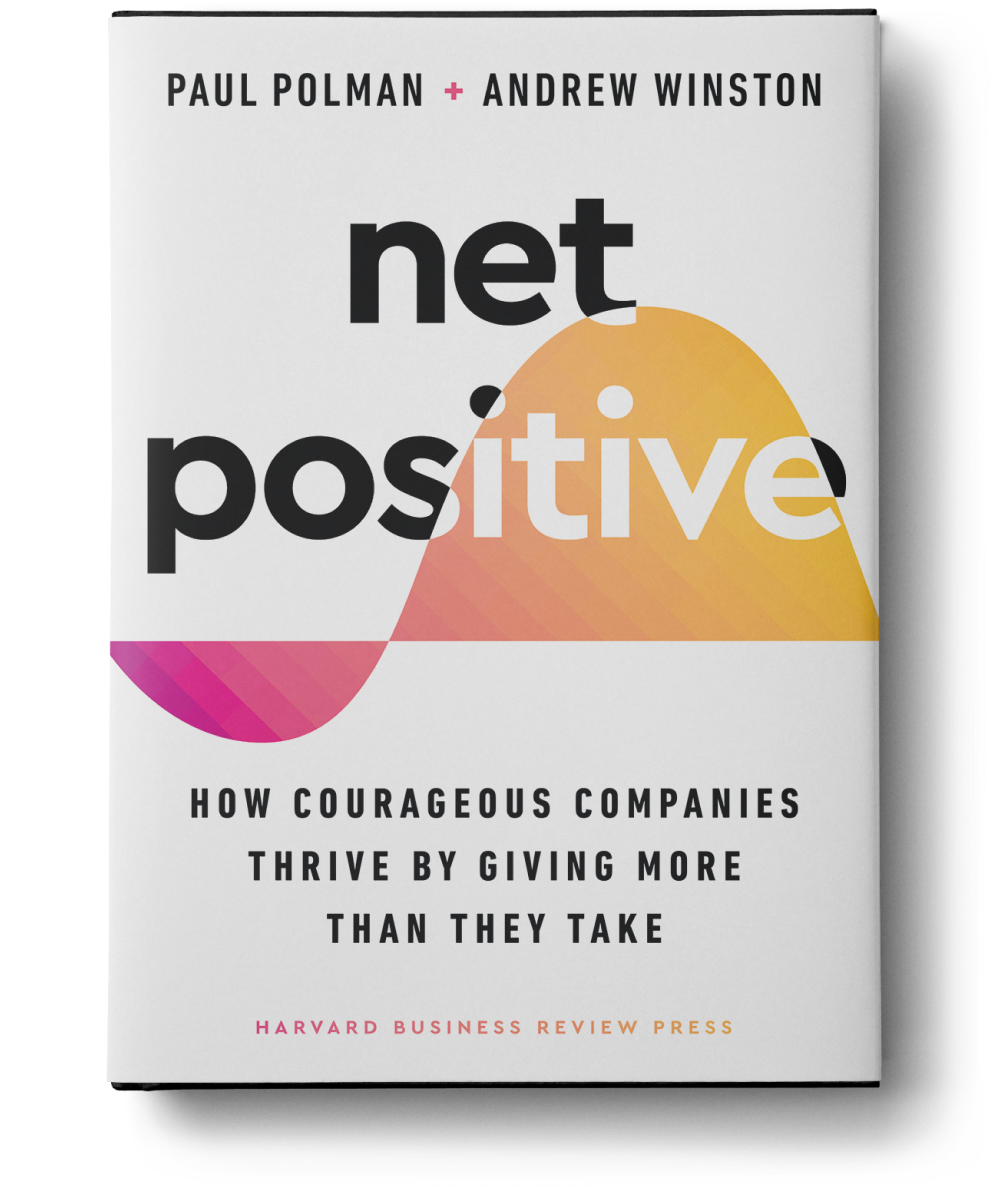Friends,
Today my book is being published and I’d like to share an exclusive preview with you. Below are the passages which get to the heart of Net Positive: How Courageous Companies Thrive by Giving More Than They Take, written with my good friend Andrew Winston.
In essence, a Net Positive company profits by fixing the world’s problems, not creating them. Ambitious? Yes, absolutely. Momentum is building within the private sector. A growing number of CEOs are waking up to the need to act on climate change and widening inequality and the huge opportunities of doing so. Business leaders are stepping up in ways unimaginable just a few years ago. We saw this during Climate Week in New York, and we can expect more of it in Glasgow for COP26 next month. Our challenge is we’re just not moving fast enough.
Well, we’re not moving fast enough yet.
We wrote this book because we believe that, with enough courage and partnership, an accelerated transformation of our private sector is now within reach, putting business in greater service of our societies and our environment. Systems transformation is never easy, but it is possible when the people who give life to those systems are willing to change, especially the leaders. Courage comes from the French word coeur, or heart, and the Net Positive journey starts with looking at ourselves, our personal purpose and willingness to do the hard, but right, thing. It’s not easy, but for the sake of our shared future, our common humanity and our one planet, it will be worth it.


What is Net Positive?
Our vision of net positive is a business that improves well-being for everyone it impacts and at all scales—every product, every operation, every region and country, and for every stakeholder, including employees, suppliers, communities, customers, and even future generations and the planet itself.
This is a North Star. No company can achieve all these aims at once, but it’s where we should be heading if we want a viable economy and planet. To exist as a relevant business today is to enrich the world. The ultimate question is this: Is the world better off because your business is in it?
What it looks like
The net positive company will operate differently from what’s normal today. It will, for example, eliminate more carbon than it produces; use only renewable energy and renewably sourced materials; create no waste and build everything for full circularity; and replenish and make cleaner all the water it draws.
As a people-driven company, it will ensure everyone working in the value chain has the dignity of a living wage. The company will offer extensive opportunities for inclusion of all races and abilities, and achieve gender balance in management and pay equity. Through its products, services, and purpose-led initiatives—not philanthropy—consumers and communities will be better off. NGOs will be treated as equals and collaborators, not antagonists. Government leaders will find they have demanding partners, not self-serving lobbyists, trying to develop a system of rules that benefits all. And investors who support long- term value creation will reap healthy financial rewards.
Picture how specific sectors might profit and grow by serving customers and the world through their work. Imagine what net positive could look like when companies solve the biggest challenges, not contribute to them:
- Food and agriculture companies embracing regenerative practices, making the soil richer, protecting biodiversity, and sequestering millions of tons of carbon
- Aluminum, cement, and steel manufacturers developing carbon-free products and taking carbon out of the air
- Consumer products companies increasing human and planetary well-being with everything they sell
- Natural resource and material companies giving back to the earth and improving lives in the indigenous communities they impact
- Social media companies helping people find truth and strengthening the democratic process
- Apparel companies decoupling their growth from further resource use, providing living wages, restoring dignity, and helping develop communities in their supply chains around the world
- Financial companies funding only clean technologies and serving the poor better than the rich, giving people a hand up and creating equal opportunities for all
These kinds of companies will regenerate the world. If being green is about doing less damage, and sustainability about reaching zero, net positive is about making things better.
Does this all sound too perfect? Perhaps. There are practical tradeoffs along the way, and you can’t advance on every front at once. While balancing multiple needs, the whole enterprise should move in the right direction. It’s a challenge, a journey, and a complicated dance, and you can’t get there in one leap. No organization, including Unilever, is far enough along the journey. But a growing number of companies are embracing elements of the net positive business model.
The opportunity here is profound and rewarding. It’s a new way of thinking about creating business value. A company giving more than it takes will not focus on profits with a side of philanthropy. Instead, it embraces purpose in the core of the business and creates value from values. This is a revolutionary way of thinking in modern business. But true innovation is almost always driven by rebels who force disruption. We need a profound shift for business to help lead the way, become the trusted player it can be, and solve problems that matter. The future of capitalism, humanity, and the planet depend on it.
